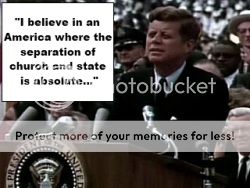
In 1960 when questions about John F. Kennedy’s religion came up, he gave a speech to the Greater Houston Ministerial Association. Although given 50 years ago, it still seems it should apply to politics today. I wish it would.
Selection from “Address to the Greater Houston Ministerial Association” delivered 12 September 1960 at the Rice Hotel in Houston, TX
While the so-called religious issue is necessarily and properly the chief topic here tonight, I want to emphasize from the outset that I believe that we have far more critical issues in the 1960 campaign; the spread of Communist influence, until it now festers only 90 miles from the coast of Florida — the humiliating treatment of our President and Vice President by those who no longer respect our power — the hungry children I saw in West Virginia, the old people who cannot pay their doctors bills, the families forced to give up their farms — an America with too many slums, with too few schools, and too late to the moon and outer space. These are the real issues which should decide this campaign. And they are not religious issues — for war and hunger and ignorance and despair know no religious barrier.
But because I am a Catholic, and no Catholic has ever been elected President, the real issues in this campaign have been obscured — perhaps deliberately, in some quarters less responsible than this. So it is apparently necessary for me to state once again — not what kind of church I believe in, for that should be important only to me — but what kind of America I believe in.
I believe in an America where the separation of church and state is absolute; where no Catholic prelate would tell the President — should he be Catholic — how to act, and no Protestant minister would tell his parishioners for whom to vote; where no church or church school is granted any public funds or political preference, and where no man is denied public office merely because his religion differs from the President who might appoint him, or the people who might elect him.
I believe in an America that is officially neither Catholic, Protestant nor Jewish; where no public official either requests or accept instructions on public policy from the Pope, the National Council of Churches or any other ecclesiastical source; where no religious body seeks to impose its will directly or indirectly upon the general populace or the public acts of its officials, and where religious liberty is so indivisible that an act against one church is treated as an act against all.
For while this year it may be a Catholic against whom the finger of suspicion is pointed, in other years it has been — and may someday be again — a Jew, or a Quaker, or a Unitarian, or a Baptist. It was Virginia’s harassment of Baptist preachers, for example, that led to Jefferson’s statute of religious freedom. Today, I may be the victim, but tomorrow it may be you — until the whole fabric of our harmonious society is ripped apart at a time of great national peril.
Finally, I believe in an America where religious intolerance will someday end, where all men and all churches are treated as equals, where every man has the same right to attend or not to attend the church of his choice, where there is no Catholic vote, no anti-Catholic vote, no bloc voting of any kind, and where Catholics, Protestants, and Jews, at both the lay and the pastoral levels, will refrain from those attitudes of disdain and division which have so often marred their works in the past, and promote instead the American ideal of brotherhood.
….
I do not speak for my church on public matters; and the church does not speak for me. Whatever issue may come before me as President, if I should be elected, on birth control, divorce, censorship, gambling or any other subject, I will make my decision in accordance with these views — in accordance with what my conscience tells me to be in the national interest, and without regard to outside religious pressure or dictates. And no power or threat of punishment could cause me to decide otherwise.
But if the time should ever come — and I do not concede any conflict to be remotely possible — when my office would require me to either violate my conscience or violate the national interest, then I would resign the office; and I hope any conscientious public servant would do likewise.
….
But if this election is decided on the basis that 40 million Americans lost their chance of being President on the day they were baptized, then it is the whole nation that will be the loser, in the eyes of Catholics and non-Catholics around the world, in the eyes of history, and in the eyes of our own people.
But if, on the other hand, I should win this election, then I shall devote every effort of mind and spirit to fulfilling the oath of the Presidency — practically identical, I might add, with the oath I have taken for 14 years in the Congress. For without reservation, I can, “solemnly swear that I will faithfully execute the office of President of the United States, and will to the best of my ability preserve, protect, and defend the Constitution — so help me God.
———————
American Rhetoric: John F. Kennedy — Address to the Greater Houston Ministerial Association